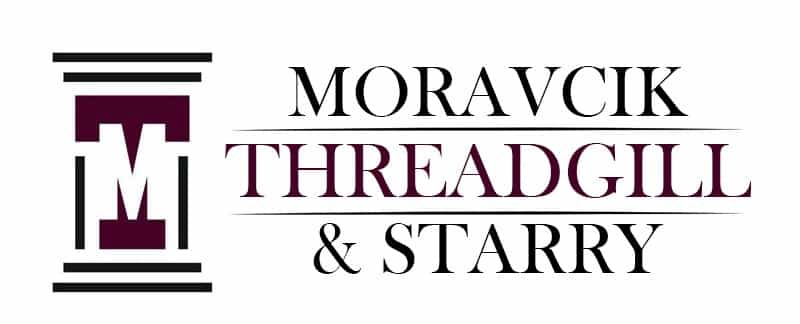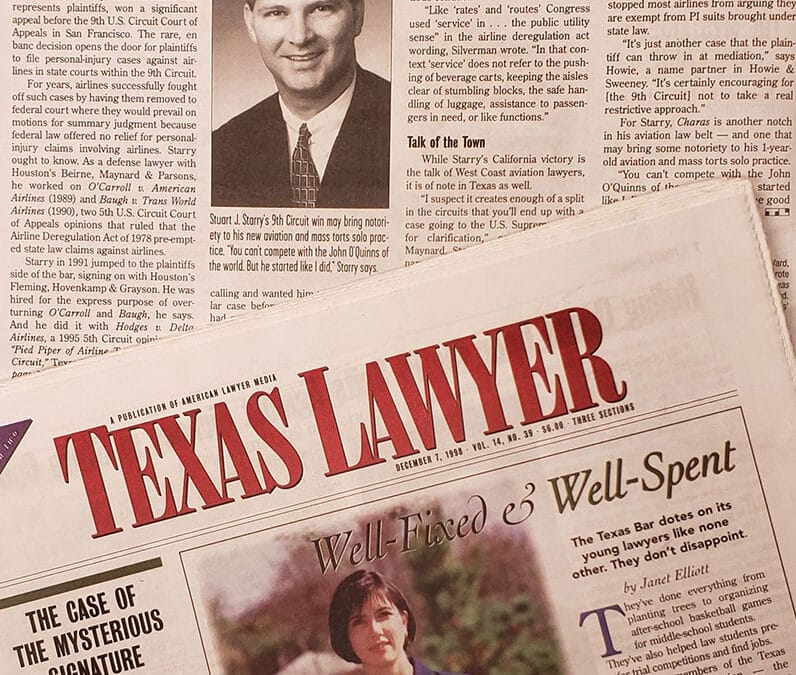TEXAS LAWYER, Dec. 7, 1998
Ruling Opens Door for PI Suits Against Airlines in State Courts
By John Council
Plaintiffs have their choice of competent aviation attorneys in Texas. But if a federal appellate challenge to the 1978 Airline Deregulation Act is specifically what they need, then Stuart J. Starry is their man.
Last week, Starry, a Houston solo who represents plaintiffs, won a significant appeal before the 9th U.S. Circuit Court of Appeals in San Francisco. The rare, en banc decision opens the door for plaintiffs to file personal-injury cases against airlines in state courts within the 9th Circuit.
For years, airlines successfully fought off such cases by having them removed to federal court where they would prevail on motions for summary judgment because federal law offered no relief for personal-injury claims involving airlines. Starry ought to know. As a defense lawyer with Houston’s Beirne, Maynard & Parsons, he worked on O’Carroll v. American Airlines (1989) and Baugh v. Trans World Airlines (1990), two 5th U.S. Circuit Court of Appeals opinions that ruled that the Airline Deregulation Act of 1978 pre-empted state law claims against airlines.
Starry in 1991 jumped to the plaintiffs side of the bar, signing on with Houston’s Fleming, Hovenkamp & Grayson. He was hired for the express purpose of overturning O’Carroll and Baugh, he says. And he did it with Hodges v. Delta Airlines, a 1995 5th Circuit opinion. [See “Pied Piper of Airline Torts Wins at 5th Circuit,” Texas Lawyer, March 27, 1995, page 1.]
Hodges established that PI suits brought in state court related to airline “operations and maintenance” were not pre-empted, but suits that dealt with airline “service” were pre-empted.
“It was a victory for consumers, but it didn’t go far enough,” Starry says.
Then a San Francisco lawyer came calling and wanted him to argue a similar case before the 9th Circuit, which had consistently ruled that the deregulation act pre-empted suits in state courts against airlines, Starry says.
The result was Charas v. Trans World Airlines, in which one of the five plaintiffs sought damages for injuries suffered when a flight attendant allegedly rammed a beverage cart into the passenger’s shoulder. Charas took Hodges a step further by holding that airlines are not exempt from suits filed under state law involving operations, maintenance or service.
“We conclude that when Congress enacted federal economic deregulation of the airlines, it intended to insulate the industry from possible state economic regulation,” wrote 9th Circuit Judge Barry G. Silverman. “It did not intend to immunize the airlines from liability for personal injuries caused by their tortious conduct.”
“Like ‘rates’ and ‘routes’ Congress used ‘service’ in . . . the public utility sense” in the airline deregulation act wording, Silverman wrote. “In that context ‘service’ does not refer to the pushing of beverage carts, keeping the aisles clear of stumbling blocks, the safe handling of luggage, assistance to passengers in need, or like functions.”
Talk of the Town
While Starry’s California victory is the talk of West Coast aviation lawyers, it is of note in Texas as well.
“I suspect it creates enough of a split in the circuits that you’ll end up with a case going to the U.S. Supreme Court for clarification,” says William L. Maynard, Starry’s former boss and a name partner in Beirne, Maynard & Parsons.
“The Supreme Court could reverse that decision. But I suspect that’s not going to happen,” says Maynard, whose clients include Southwest Airlines. “I expect that 9th Circuit decision will stand and that’s the way things are probably going.”
John R. Howie, a Dallas aviation lawyer who represents plaintiffs, says the 9th Circuit decision may not have much impact in Texas since Hodges has stopped most airlines from arguing they are exempt from PI suits brought under state law.
“It’s just another case that the plaintiff can throw in at mediation,” says Howie, a name partner in Howie & Sweeney. “It’s certainly encouraging for [the 9th Circuit] not to take a real restrictive approach.”
For Starry, Charas is another notch in his aviation law belt – and one that may bring some notoriety to his 1-year-old aviation and mass torts solo practice.
“You can’t compete with the John O’Quinns of the world. But he started like I did,” Starry says. “That’s the good news.”
Copyright 1998, Texas Lawyer, All rights reserved


Recent Comments